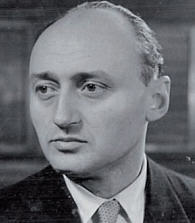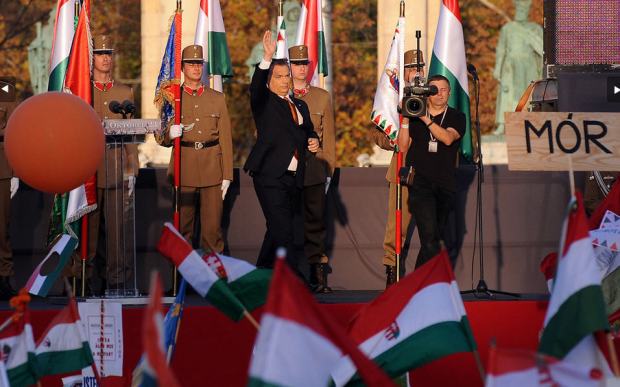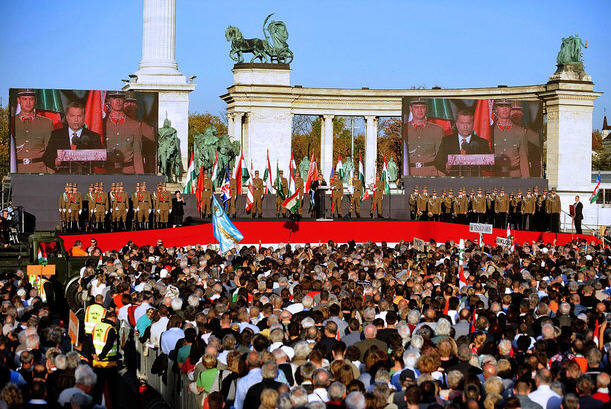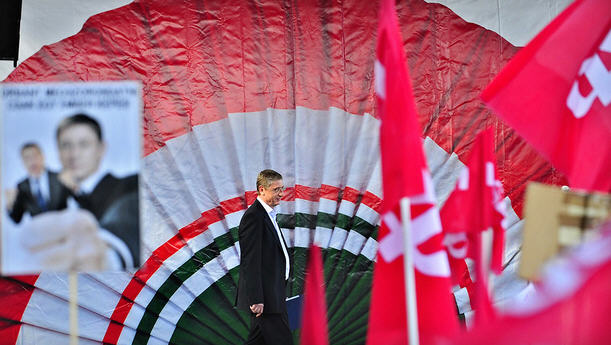Below you’ll find two remarkable speeches that were delivered yesterday: the first by Gábor Kuncze, long-time chairman of the liberal SZDSZ, and the second by Ferenc Gyurcsány, former prime minister and head of the Democratic Coalition. Both men said almost the same thing, and they were not alone in their criticism of the arrangement worked out by Gordon Bajnai’s Együtt-2014-PM and MSZP. They were joined by three other politicians who have been active in Hungarian politics over the last twenty or so years.
These speeches preceded Attila Mesterházy’s speech, which signaled the close of the large meeting of those who oppose Viktor Orbán and his government. Thus, the crowd’s demand that Mesterházy embrace the cause of unity is understandable.
* * *
The speech of Gábor Kuncze: My friends! It is from this spot that in 1956 those youngsters began their march for freedom and did something for it. They did what their country demanded and with their action they were written into the annals of world history.
Viktor Orbán knows what he wants and he tells us often without trying to hide anything. In Kötcse, in Tusnádfürdő, and the last time in London. Power for twenty years, riches to the Fidesz political family. Obedience and blind faith. His faithful flock understands his speech.
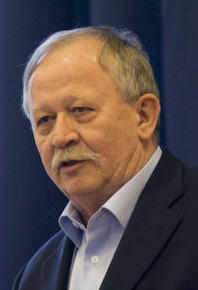
Gábor Kuncze
Anyone who wants to put his own freedom into Orbán’s hands and his money into his pockets should vote for him. Anyone who is a political adolescent who wants to have a fatherly leader above him should vote for him.
There is nothing left to uncover about Orbán, and it is not worth wailing over his arrogant power play, over the legalized theft, over the humiliation of citizens, over the fraudulent election in Baja. One mustn’t moan but must do something. If we are stranded with the mafia government of Orbán it will be not his but our disgrace.
Yes, our disgrace because those who want what Orbán does are few but still enough. In vain are we more numerous; we are still few. More than half of the electorate wants to get rid of this government, yet today Fidesz would still win the election. Because the democratic forces at the moment are unfit for the realization of society’s expectations.
The collaboration of opposition forces today consists of divvying up the meager leftovers after an expected defeat. Their main concern is who will receive how many places on the solace lists of a common defeat. I don’t ask for a place on these lists either for myself or for my fellow liberals. Because this fight cannot be won by sharing the spoils under the guise of cooperation.
It is not cooperation when the most important consideration of the negotiating partners is that after the lost election they will be able to form a separate parliamentary caucus, even if only with a few people. As if they were fighting for separate graves on the grounds of a common cemetery.
We cannot allow that to go on because we would be betraying the Hungary of freedom, civic virtues, and solidarity.
Today many of us follow each other on the stage. This is a large step for the parties but a rather small one for the country. Let’s speak clearly at last and let’s not celebrate something that should have been done a year ago and which, in its present form, time has already passed by. What kind of tennis players are we to wait a year to return Fidesz’s serves?
Therefore
• First of all: the election can be won only in the electoral districts. Therefore we must together find and support those candidates who have the best chance of winning. It is not enough to extort at the negotiating table electoral districts without strong candidates and without the appropriate organization. Beside every candidate’s name there must be the name of the common organization that will embody the collaborating parties.
• Second: there must be a common list because that makes the voter’s choice easier and that is what motivates them most. The question is not how many people want a change of government but how many people believe that change is possible. A common list also means a common list leader. If that cannot be achieved by the negotiating parties, we will have to think further. If you cannot achieve that on your own, the electorate will have to force your hand.
• Third: With the provisions of the new electoral law the government legalized the possibility of electoral fraud. Let us not have any illusion: if Fidesz needs it, they will commit fraud. Therefore, by the time of the election we must organize the widest possible monitoring system.
Failure to do everything possible for the recovery of our lost freedom would mean a betrayal of our compatriots. It is not enough to love freedom and democracy. One must want them and do something for them. My friends! We will not write world history as those young people did in 1956, but we are responsible for our children and we owe something to the memory of those heroes. We must also do what the homeland demands!
* * *
The speech of Ferenc Gyurcsány:
Good day!
Seemingly I will speak of politics. But only seemingly. Because what I will be talking about first and foremost is morality.
A few days ago I may have met you personally on Szabadság Square. It was at that time that I said: “I will say straight out what others try to avoid. I take full responsibility for what others shirk from.”
There is no time for political maneuvering. There is no time to tell only half-truths.
So, I will say again in plain language: if we continue this way we will lose next year’s election and with it the cause of freedom, the cause of the republic, the chance for advancement and a truly European existence.

Source: fel.hu / Photo Attila Szakonyi
I know Viktor Orbán. Twice I took part in a campaign that ended in his defeat. I know that Hungary today is led by a mendacious political scoundrel. We’ve said it already a hundred times, we’ve said it a thousand times but, tell me, how much better off are we by saying it one more time?
How far would that take us? After all, together we have already decided on the verdict: Orbán must go! We say that together with the voters who want change, and the voters are right. But while the majority wants to see Orbán gone, and this is also what the parties and movements of the opposition want, today our cause is languishing.
Why are we facing this situation?
Because in order to be victorious over Orbán, first and foremost we must conquer ourselves. Conquer our bad habits, our faintheartedness, dissension, and selfishness.
But the voters don’t say only this. They don’t say only—how does the slogan go?—Orbán, beat it! No, they don’t say only that. They also tell us how it can be done. They say it clearly, loudly, unreservedly that we, the parties, the movements, the supporters of the opposition, must unite. To unite not half-heartedly but tightly holding on to each other.
Orbán must be confronted with an unequivocal , united challenge. We need a unified bloc of opposition parties. In order to be victorious over Orbán we need a common program, a common candidate for prime minister, a common party list, and common candidates.
What stands in the way of a unified bloc?
Perhaps the machinations of the government? No!
The will of God? Of course not!
Perhaps some unavoidable legal pettifoggery? Not at all!
We ourselves are the impediments. Our acquiescence in the less instead of the adequate.
In the last analysis it is the lack of magnanimity, the inability to compromise, the selfishness, and the impenetrable personal ambition. For all this it is not Orbán who is responsible; we are.
We remember October 1956 as the great moment of the Hungarian people. A moment when the cause of the country was greater than fear, when patriots were ready to give their lives for the cause of freedom and victory over tyranny. But it is not enough to talk about those heroes. One must understand their example.
Today nobody has to die for his country. Today a great deal less would be sufficient. It would be enough to seriously think and seriously do everything that is possible to bring about the fall of Orbán, the defeat of tyranny.
The party I lead, the Democratic Coalition, is the most implacable opponent of Orbán. With us there is no bargain, no compromise, no arrangement. As chairman of this party, I will be working until next spring and even after for the creation of a Hungary of free citizens. To create a free, welcoming home from this homeland.
But let me speak clearly, firmly, and unequivocally: to talk about unity but not do anything about it is not enough. One mustn’t just talk about collaboration, one must create its preconditions. It is not enough to talk about collaboration; one must actually collaborate.
I say what others side step: I will do everything possible to remove all obstacles in the way of a strong, unified republican oppositional bloc. Because we must subordinate everything else to that goal.
So, I will be explicit!
The opposition needs one leader. Not two, not three, not eight but one. Only one. A leader who can unite all democrats, who can lead us to victory. Whoever is unable to do this, whose ambitions hinder an all-embracing cooperation, must rethink his role. There can be no compromise here. And if there is no solution forthcoming—let’s talk clearly—then a new leader must be asked to be the candidate for the post of premiership. Because the opposition needs a common leader! Not two, not three, not eight!
The opposition needs only one party list. Naturally, the political leaders nationwide want to be part of the legislature in order to represent the ideas in which they believe. And that’s how it should be. But if someone’s parliamentary ambitions prevents the setting up of a common list of the republican oppositional bloc, then that person must let someone else take his place. And let me speak clearly again: If I were such an obstacle—I believe that I’m not—but if I were, I would retire from the race.
Because I’m not fighting for a seat in parliament. I am fighting for victory. Not victory for me but for us, the citizens of democratic Hungary. And there shouldn’t be any misunderstanding: I will do everything in my power to reach that goal. If necessary I will plough up the country from left to right to offer an example of struggle, passion, straight and plain talk.
To conclude, as Gábor Kuncze, my friend and colleague, said: the republican opposition should have in every district only one common candidate. Today this is not the case. We must agree and we must be willing to withdraw our candidates in a proportional fashion. There is no other way and we in the Democratic Coalition are ready to do just that. Then you should be ready to do it as well! One mustn’t be selfish, one must be ready to sacrifice. The service of the country is paramount. At any price!
The negotiations mustn’t be closed, but must be opened up again! The new constitution was supposed to be cut in granite and yet by now they have amended it six times. They keep amending it because what is not democratic cannot be lasting. And the agreement our colleagues signed is not democratic, not lasting because it doesn’t satisfy the will of the democratic voters. Therefore, we must negotiate, negotiate, and at the end agree. The sooner the better. It might be tomorrow, but at the latest in the spring. We are ready.
And at the very end, in closing.
My dear friends. I’m not worried about the Democratic Coalition. We will be in the next Parliament. I should add that I’m not worried about myself because I—to the sorrow of some and I hope to the delight of many—will remain a politician and will lead my party to success.I’m worried about my homeland.
I would do anything to enable her to be free again and the home of hope and quietude.
I will fight for that.
For Hungary and for the Republic!
 What does one have to do to become a party leader? One must have at least twenty-six good friends or, better put, business partners who are willing to declare themselves candidates in a given electoral district. Each candidate need collect only 500 signatures. That certainly shouldn’t be difficult. Once it has 27 candidates, the new “Swindlers’ Party” can have a party list, and from there on it will receive money that it can spend on anything it wishes, no receipts required.
What does one have to do to become a party leader? One must have at least twenty-six good friends or, better put, business partners who are willing to declare themselves candidates in a given electoral district. Each candidate need collect only 500 signatures. That certainly shouldn’t be difficult. Once it has 27 candidates, the new “Swindlers’ Party” can have a party list, and from there on it will receive money that it can spend on anything it wishes, no receipts required.


